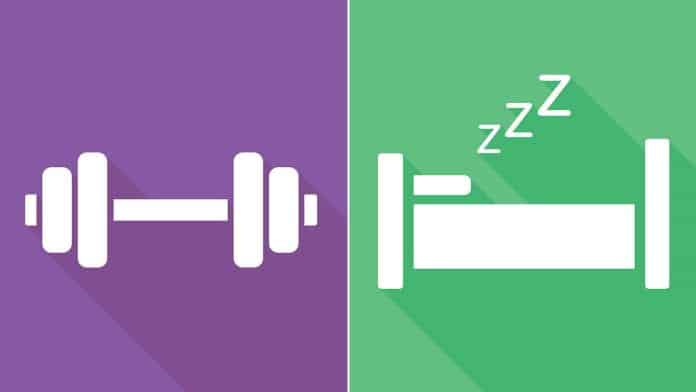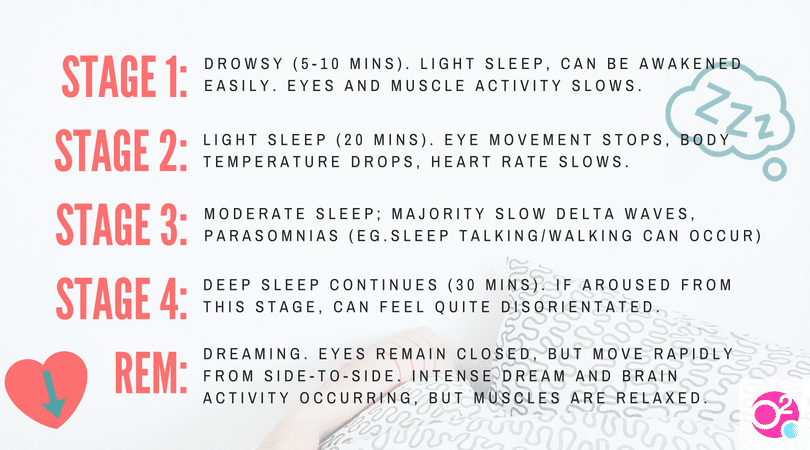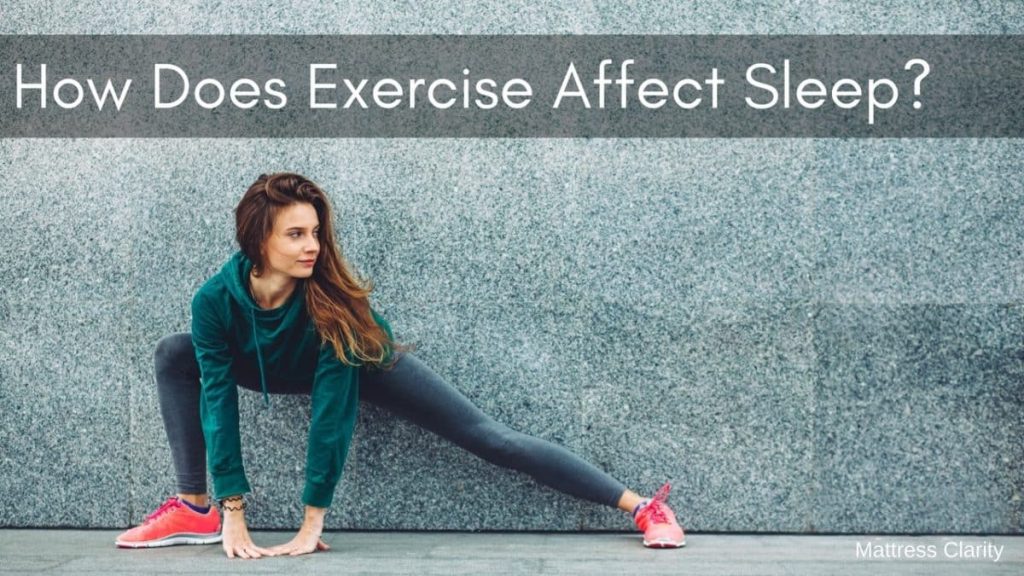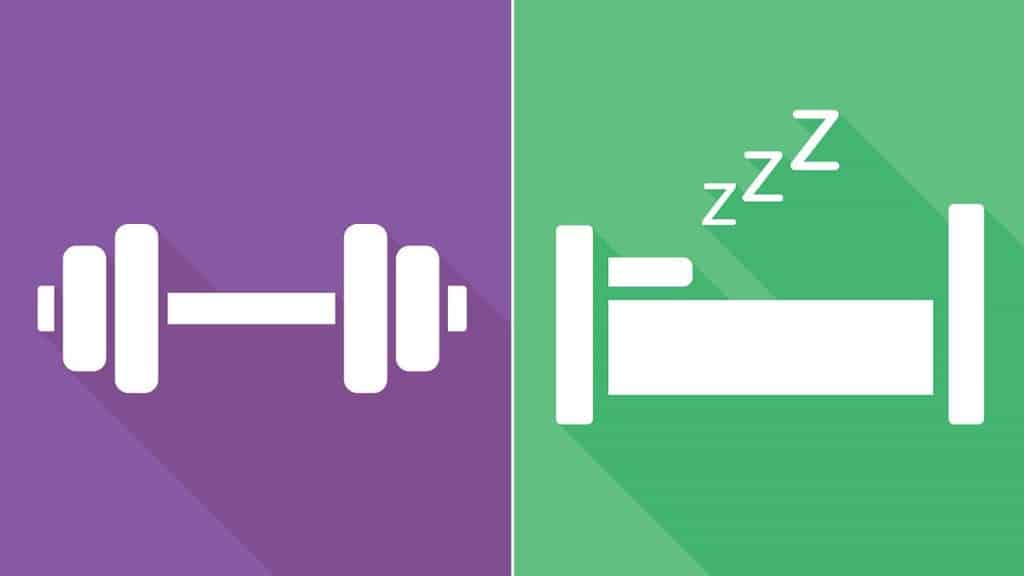We all love a good night’s sleep, don’t we? But have you ever wondered how exercise affects our sleep patterns? In this article, we will explore the fascinating relationship between exercise and sleep and uncover the ways in which getting active can lead to a more restful and rejuvenating slumber. Grab your workout gear and join us on this journey to better sleep!
This image is property of o2active.com.au.
Review contents
Physical benefits of exercise on sleep
Effects of exercise on sleep quality
Regular exercise has a significant positive impact on sleep quality. Engaging in physical activity helps to improve the overall quality of sleep by promoting deeper and more restorative rest. When we exercise, our body releases endorphins, which are natural feel-good chemicals that help reduce stress and anxiety. These endorphins not only enhance our mood but also help us achieve a more relaxed state, making it easier to fall asleep and stay asleep throughout the night.
Reduction of insomnia symptoms
One of the most noticeable physical benefits of exercise on sleep is the reduction of insomnia symptoms. Insomnia, characterized by difficulty falling asleep or maintaining sleep, can be improved through regular exercise. Studies have shown that individuals who engage in moderate to vigorous physical activity experience a decrease in the time it takes to fall asleep and an increase in total sleep time. Exercise helps to regulate our body’s internal clock, making it easier for us to establish a consistent sleep pattern.
Improvement in sleep duration
Exercise also plays a crucial role in improving sleep duration. It has been found that individuals who lead a sedentary lifestyle tend to experience shorter sleep durations compared to those who are physically active. Incorporating regular exercise into our routine promotes a longer and more restful night’s sleep. This is due to the fact that exercise helps to tire our body physically, making it easier for us to achieve a state of deep sleep.
Enhancement of sleep efficiency
Sleep efficiency refers to the amount of time we spend asleep in relation to the total time spent in bed. Regular exercise has been shown to enhance sleep efficiency by reducing the amount of time spent awake during the night. Exercise helps to regulate our body’s sleep-wake cycle, ensuring that we are able to fall asleep faster and stay asleep throughout the night without frequent awakenings.
Regulation of circadian rhythm
Our circadian rhythm, also known as our body’s internal clock, plays a crucial role in determining our sleep patterns. Exercise has a positive impact on the regulation of our circadian rhythm, helping us maintain a consistent sleep-wake cycle. By engaging in physical activity regularly, we synchronize our body’s natural rhythms, making it easier to fall asleep at the desired time and wake up feeling refreshed.
Psychological benefits of exercise on sleep
Reduction in stress and anxiety
Exercise is not just beneficial for our physical well-being; it also has a profound impact on our mental health. Regular physical activity has been found to reduce stress and anxiety levels, which can significantly improve sleep quality. When we exercise, our body releases endorphins, which act as natural painkillers and mood elevators. These endorphins help to alleviate stress and anxiety, promoting a more relaxed state of mind conducive to better sleep.
Enhancement of mood and mental well-being
Engaging in regular exercise has been linked to an improvement in overall mood and mental well-being. Exercise stimulates the release of neurotransmitters such as serotonin, dopamine, and norepinephrine, which are often referred to as “feel-good” chemicals. These neurotransmitters not only boost our mood but also help to regulate emotions and promote a sense of well-being. By incorporating exercise into our routine, we can experience a greater sense of happiness and contentment, leading to improved sleep quality.
Prevention and management of depression
Exercise has been proven to be an effective complementary treatment for depression. Regular physical activity stimulates the production of endorphins and other neurotransmitters that help to alleviate symptoms of depression. By engaging in exercise, we can reduce feelings of sadness, hopelessness, and fatigue, all of which are common symptoms of depression. Improved mental well-being resulting from exercise can contribute to better sleep and overall wellness.
Improvement in cognitive function
Regular exercise has been associated with improved cognitive function, including enhanced memory, attention, and problem-solving skills. Exercise promotes increased blood flow to the brain, which brings essential nutrients and oxygen. This influx of blood and oxygen helps to nourish our brain cells, improve neural connections, and support overall brain health. By incorporating exercise into our routine, we can experience sharper cognitive function, leading to improved sleep quality and mental acuity.
Promotion of relaxation and bedtime routine
Incorporating exercise into our routine can also promote relaxation and enhance the effectiveness of our bedtime routine. Engaging in activities such as gentle stretching, yoga, or deep breathing exercises before bed can help to calm our mind and prepare our body for sleep. These relaxing exercises can reduce muscle tension, lower heart rate, and promote a state of relaxation conducive to better sleep. By establishing a bedtime routine that includes exercise, we signal to our body and mind that it is time to wind down and prepare for rest.
Timing of exercise and its impact on sleep
Effects of morning exercise on sleep
Morning exercise can have positive effects on sleep. Engaging in physical activity in the morning helps to jumpstart our metabolism, increase our energy levels, and set a positive tone for the day. It has been found that morning exercise can help regulate our body’s internal clock and promote a more consistent sleep-wake cycle. However, it is important to avoid engaging in intense exercise too close to bedtime, as it may interfere with our ability to fall asleep quickly.
Effects of afternoon exercise on sleep
Exercising in the afternoon can also have a positive impact on sleep. Afternoon exercise helps to alleviate any midday drowsiness and boosts our energy levels, making us feel more awake and alert. Engaging in physical activity during this time can help us maintain higher levels of productivity throughout the day and reduce the likelihood of experiencing an energy slump later in the evening. However, it is essential to complete afternoon exercise several hours before bedtime to allow our body to wind down and prepare for rest.
Effects of evening exercise on sleep
While exercise in the evening can be beneficial for some individuals, it is important to be mindful of its timing to prevent any negative impact on sleep. Engaging in high-intensity exercise too close to bedtime may cause an increase in adrenaline and body temperature, making it challenging to fall asleep. It is recommended to complete evening exercise at least two to three hours before bed to allow our body and mind to relax and unwind. Gentle activities such as stretching, light yoga, or a leisurely walk in the evening can be a pleasant way to wind down and promote better sleep.
Considerations for individuals with sleep disorders
Individuals with sleep disorders may need to tailor their exercise routine to accommodate their specific condition. It is advisable to consult with a healthcare professional to determine the most appropriate exercise plan. For example, individuals with insomnia may benefit from engaging in relaxation exercises or gentle yoga before bed. Those with sleep apnea should focus on exercises that strengthen the respiratory muscles. It is essential to listen to our body and adjust our exercise routine accordingly to optimize sleep quality.
Optimal exercise duration and intensity
The optimal duration and intensity of exercise may vary depending on individual preferences, fitness levels, and overall health. Generally, it is recommended to engage in at least 150 minutes of moderate-intensity aerobic activity or 75 minutes of vigorous-intensity aerobic activity per week for overall health benefits. However, the specific exercise duration and intensity that promote better sleep may vary for each person. It is essential to find an exercise routine that feels comfortable and enjoyable, promoting overall well-being and supporting better sleep.
Physiological mechanisms of exercise-sleep relationship
Increase in body temperature and subsequent drop
One of the physiological mechanisms underlying the exercise-sleep relationship is the increase in body temperature during physical activity. Exercise raises our body temperature, and this increase signals to our body that it is time to be awake and alert. However, after exercise, our body temperature begins to drop as part of the natural cooling process. This drop in body temperature helps induce sleepiness and prepares our body for rest, enhancing the quality of our sleep.
Stimulation of endorphin release
Exercise stimulates the release of endorphins, which are natural chemicals in our body that act as pain relievers and mood enhancers. The release of endorphins during exercise promotes a state of relaxation, reduces stress and anxiety levels, and enhances overall well-being. These positive effects of endorphins on our mental state contribute to better sleep quality, as a calm and relaxed mind is more likely to experience uninterrupted and restful sleep.
Effects on hormones like cortisol and melatonin
Exercise has been found to modulate the production and regulation of hormones involved in sleep, such as cortisol and melatonin. Cortisol, commonly known as the stress hormone, is typically higher in the morning and gradually decreases throughout the day. Regular exercise can regulate cortisol levels, helping to maintain a healthy balance and promote better sleep. Melatonin, often referred to as the sleep hormone, is released in response to darkness and helps regulate our sleep-wake cycle. Exercise can help synchronize melatonin production, promoting a more consistent sleep pattern.
Reduction of inflammation
Regular exercise has anti-inflammatory effects on our body. Inflammation has been linked to various health conditions, including sleep disturbances. By engaging in physical activity, we can reduce chronic low-grade inflammation and improve our overall health. This reduction in inflammation can contribute to better sleep quality, as our body is not burdened by excessive inflammation that may disrupt the sleep process.
Promotion of physical fatigue
Exercise promotes physical fatigue by tiring our muscles and stimulating the body’s repair and recovery processes during sleep. Engaging in physical activity helps to expend energy, making it easier for us to achieve a state of physical exhaustion and relaxation. This physical fatigue promotes deeper and more restorative sleep, enabling our body to recover and regenerate during the night.
This image is property of o2active.com.au.
Exercise type and its influence on sleep patterns
Aerobic exercises and sleep
Aerobic exercises, such as running, cycling, swimming, or dancing, have been found to have a positive impact on sleep patterns. Aerobic activities increase heart rate, improve cardiovascular health, and enhance overall fitness. These exercises promote the release of endorphins, reduce stress levels, and contribute to better sleep quality. Aerobic exercises are often recommended for individuals struggling with sleep disturbances as they help to regulate sleep-wake cycles and improve overall sleep duration and efficiency.
Strength training and sleep
Strength training exercises, such as weightlifting or resistance training, can also contribute to better sleep. While the immediate effects of strength training may lead to temporary increased alertness due to the rise in adrenaline, long-term adherence to strength training has been linked to improved sleep quality. Strength training helps to build lean muscle mass, improve overall physical strength, and support better sleep by promoting physical fatigue and relaxation.
Yoga and sleep
Yoga, with its focus on gentle movements, stretching, and controlled breathing, has long been associated with promoting relaxation and improving sleep. The combination of physical exertion, mindful movements, and deep breathing helps to calm the nervous system, reduce stress, and induce a state of relaxation, making it easier to fall asleep and stay asleep throughout the night. Incorporating regular yoga practice into our routine can help enhance sleep quality and overall well-being.
Tai chi and sleep
Tai chi, an ancient Chinese martial art characterized by slow and meditative movements, has been found to have a positive impact on sleep. This mind-body exercise combines gentle movements, deep breathing, and meditation, promoting relaxation and reducing stress levels. Tai chi is often practiced in the evening, making it an ideal activity to wind down and prepare for rest. Regular tai chi practice has been associated with improved sleep quality, duration, and overall sleep satisfaction.
Effectiveness of different exercise modalities
While each type of exercise offers its unique benefits, it is important to choose a modality that aligns with our individual preferences and goals. Whether it’s cardio exercises, strength training, yoga, or tai chi, the most effective exercise modality for improving sleep quality will vary from person to person. It is essential to find a form of exercise that we enjoy and can incorporate consistently into our routine. By choosing an exercise we love, we increase the likelihood of sticking with it and reaping the sleep-enhancing benefits over the long term.
Individual factors affecting exercise-sleep relationship
Age and exercise impact on sleep
Age plays a significant role in the exercise-sleep relationship. As we age, our sleep patterns naturally change, and our body’s response to exercise may also be different. While regular exercise is beneficial for individuals of all ages, older adults may need to adjust their exercise routine to accommodate any physical limitations or health conditions. It is important to consult with a healthcare professional to determine the most appropriate exercise plan that promotes sleep and supports overall health for each specific age group.
Gender differences in exercise-sleep connection
Gender may also influence the exercise-sleep connection. Studies have indicated that women often experience greater improvements in sleep quality and duration compared to men when engaging in regular exercise. Hormonal differences and variations in sleep architecture between genders may contribute to this discrepancy. However, it is important to note that the exercise-sleep relationship is beneficial for both men and women, and the overall impact of exercise on sleep should not be overshadowed by gender differences.
Health conditions and exercise-sleep interaction
Individuals with pre-existing health conditions may experience varying effects of exercise on sleep. Certain health conditions, such as chronic pain or cardiovascular issues, may require modifications to the exercise routine to prevent exacerbation of symptoms or discomfort. It is crucial for individuals with underlying health conditions to consult with a healthcare professional to receive personalized guidance on the most suitable exercise plan that supports sleep and overall well-being.
Effects of medications on exercise and sleep
Medications can also have an impact on the exercise-sleep relationship. Certain medications, such as stimulants or antidepressants, may affect sleep patterns or energy levels, making it necessary to adjust exercise timing or intensity. It is important to consult with a healthcare professional or pharmacist to understand the potential effects of medications on sleep and exercise, and to determine the most appropriate approach to incorporating exercise into our routine.
Personal preferences and adherence to exercise
Personal preferences and enjoyment play a crucial role in the adherence to an exercise routine. Choosing activities that we genuinely enjoy increases our motivation and makes it more likely for us to stick with our exercise program over the long term. If we find joy in our chosen form of exercise, we are more likely to prioritize it and make it a consistent part of our routine. By aligning our exercise routine with personal preferences, we can reap the maximum sleep-enhancing benefits while maintaining a positive outlook on physical activity.
This image is property of sp-ao.shortpixel.ai.
Sleep disorders and exercise as a complementary therapy
Insomnia and exercise intervention
Insomnia, a common sleep disorder characterized by difficulty falling asleep or staying asleep, can be improved through the incorporation of exercise. Engaging in regular exercise has been shown to reduce the time it takes to fall asleep and improve overall sleep quality in individuals with insomnia. However, it is essential to be mindful of the timing and intensity of exercise, as intense physical activity close to bedtime may have an adverse impact on sleep for individuals with insomnia. Consulting with a healthcare professional or sleep specialist is recommended for tailored exercise recommendations.
Sleep apnea and exercise management
Sleep apnea, a sleep disorder characterized by pauses in breathing during sleep, can greatly benefit from regular exercise. Exercise helps to strengthen the respiratory muscles and improve cardiovascular health, both of which can contribute to the management of sleep apnea. Engaging in moderate aerobic exercises, such as brisk walking or cycling, can assist in weight management, reduce the severity of sleep apnea symptoms, and improve overall sleep quality.
Restless legs syndrome and exercise benefits
Restless legs syndrome (RLS) is a neurological disorder that causes an irresistible urge to move the legs, often accompanied by uncomfortable sensations. Exercise has been found to alleviate symptoms of RLS, as physical activity helps to reduce restlessness and promote relaxation. Engaging in regular exercise, particularly low-impact activities such as walking or swimming, can help reduce RLS symptoms and improve sleep quality.
Narcolepsy and exercise recommendations
Narcolepsy, a chronic sleep disorder characterized by excessive daytime sleepiness and sudden episodes of sleep, may benefit from regular exercise. Exercise can help to alleviate excessive daytime sleepiness by promoting alertness and improving energy levels. Engaging in regular moderate-intensity exercise, such as jogging or dancing, can enhance overall sleep quality and support better management of narcolepsy symptoms. However, it is important to be cautious with exercise timing, as intense physical activity close to bedtime may interfere with sleep quality.
Effectiveness of exercise as adjunct therapy
Exercise serves as an effective complementary therapy for a wide range of sleep disorders. When used in conjunction with other treatment approaches, exercise can significantly improve sleep quality and overall well-being. However, it is important to remember that exercise alone may not be a standalone solution for sleep disorders. It is crucial to work closely with healthcare professionals or sleep specialists to receive appropriate guidance on how to incorporate exercise effectively into a comprehensive treatment plan.
Tips for incorporating exercise into your sleep routine
Establish a consistent exercise schedule
Creating a consistent exercise schedule and sticking to it can greatly contribute to incorporating exercise into our sleep routine. By designating specific days and times for exercise, we can prioritize physical activity and ensure that it becomes a regular part of our day. Consistency is key when it comes to reaping the sleep-enhancing benefits of exercise.
Choose activities that you enjoy
Selecting activities that you genuinely enjoy is essential for maintaining long-term exercise adherence. By choosing activities that bring us joy and fulfillment, we are more likely to look forward to them and make exercise a positive part of our routine. Whether it’s dancing, hiking, swimming, or practicing yoga, finding activities that align with our interests and preferences improves the likelihood of incorporating exercise into our regular sleep routine.
Avoid exercising too close to bedtime
Exercising too close to bedtime can stimulate the body and make it challenging to fall asleep. It is important to allow an adequate amount of time to wind down and relax before heading to bed. Aim to complete exercise at least two to three hours before bedtime to allow our body to cool down and prepare for sleep.
Create a wind-down routine after exercise
After completing exercise, it is beneficial to establish a wind-down routine to signal to our body and mind that it is time to relax and prepare for sleep. This routine can include activities such as stretching, gentle yoga, or reading a book. Engaging in calming activities and avoiding stimulating electronic devices can help transition our mind and body into a state of relaxation.
Be mindful of individual limitations and preferences
It is important to be mindful of individual limitations and preferences when incorporating exercise into our sleep routine. Each person has unique physical abilities and preferences when it comes to exercise. It is crucial to listen to our body and choose activities that are suitable for our fitness level, health condition, and personal preferences. By being mindful of our limitations, we can ensure a safe and enjoyable exercise experience.
This image is property of www.mattressclarity.com.
Barriers to exercise and sleep improvement
Lack of motivation and commitment
Lack of motivation and commitment is a common barrier to incorporating exercise into our sleep routine. It can be challenging to stay motivated, especially when faced with busy schedules, fatigue, or competing priorities. It is important to find sources of motivation and to establish clear goals that align with our individual desires and values. Setting achievable goals, finding an exercise buddy, or seeking support from a fitness professional can help overcome this barrier and maintain long-term commitment.
Physical limitations or disabilities
Physical limitations or disabilities can pose challenges when it comes to exercise and sleep improvement. However, exercise can be adapted to suit individual needs and abilities. Consulting with a healthcare professional or a certified exercise specialist can provide guidance in creating a personalized exercise plan that accommodates physical limitations while still reaping the sleep-enhancing benefits. It is important to focus on what we can do rather than what we cannot, and to seek out alternative forms of exercise that can be enjoyed within our capabilities.
Time constraints and busy lifestyle
Many individuals face time constraints and a busy lifestyle, making it difficult to prioritize exercise. However, incorporating exercise into our sleep routine does not necessarily require large time commitments. Even short bursts of physical activity throughout the day can accumulate and contribute to overall fitness and sleep quality. By identifying small pockets of time for physical activity, such as taking the stairs instead of the elevator or going for a brisk walk during lunch breaks, we can overcome this barrier and make exercise a consistent part of our day.
Environmental factors affecting exercise
Environmental factors, such as weather conditions or access to exercise facilities, can impact exercise adherence. However, by being creative and flexible, we can adapt our exercise routine to accommodate these environmental constraints. Investing in home exercise equipment or finding alternative indoor activities during inclement weather can provide solutions. Additionally, exploring outdoor exercise options in safe and suitable environments can help overcome environmental barriers.
Addressing and overcoming common barriers
Addressing and overcoming common barriers to exercise and sleep improvement requires a proactive approach and the development of strategies for success. These strategies may include setting realistic goals, creating a support network, seeking professional guidance, and establishing accountability measures. By identifying and addressing barriers, we can develop a resilient mindset and adopt sustainable lifestyle habits that promote regular exercise and improved sleep.
Conclusion
Exercise has numerous physical and psychological benefits on sleep. Regular physical activity improves sleep quality, reduces insomnia symptoms, enhances sleep duration and efficiency, and regulates the circadian rhythm. Exercise also has positive effects on mental well-being, reducing stress, anxiety, and depression, while improving mood and cognitive function. The timing and type of exercise, as well as individual factors, play a role in the exercise-sleep relationship. Physiological mechanisms, such as temperature regulation and hormone modulation, further contribute to the impact of exercise on sleep. Choosing enjoyable activities, recognizing and addressing barriers, and incorporating exercise into a sleep routine can help individuals experience the full benefits of exercise on sleep. It is important to consult with healthcare professionals and find a balance that suits individual needs and preferences. With consistent effort and the right approach, exercise can be a powerful tool for promoting better sleep and overall well-being.
This image is property of images.everydayhealth.com.
































